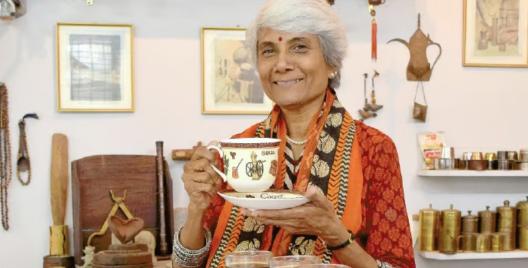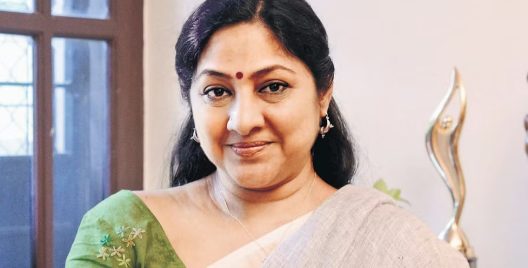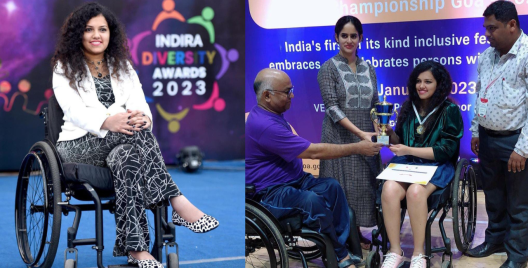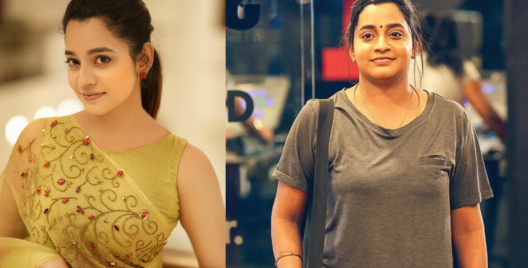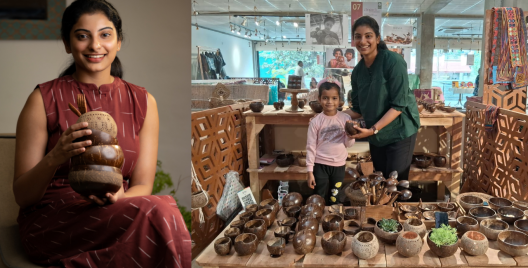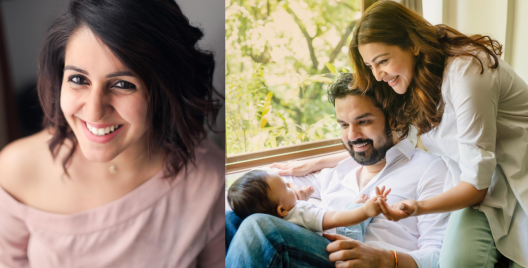Over the last 5 years, their journey of enabling opportunities in this region has evolved. They have provided scholarships for students worth 50 Lakhs and nutrition for children in school over the last year. Setting up libraries in all the schools has been a big dream. Currently, the four schools have libraries with over 5000+ books. Various champions have enabled the journey of bridging the digital literacy gap by supporting the setup of two computer labs with over 20 computers, 100 tabs, and 6 projectors in these schools.
Their Story
Nisha and Gowtham were Teach for India fellows from 2010-12 and Shivaranjani and Dravina did their fellowship from 2016-2018. Nisha and Gowtham became core team members of the Chennai Teach For India and were instrumental in setting up the team and operations. In 2017, they moved to rural Cuddalore to work with these schools and they were joined by Dravina and Shivaranjani after completing their fellowship. They met the founder of ASSEFA- Association for Sarva Seva Farms who worked in developing the agricultural land under the Bhoodan movement collected by Vinoba Bhave ji. Mr. Loganathan, fondly known as Annachi, met them and invited them to undertake the schools in Cuddalore under the ASSEFA foundation. Since 2017, they have been working with the schools and the adjoining communities.
What’s the mission and vision for Kanavu?
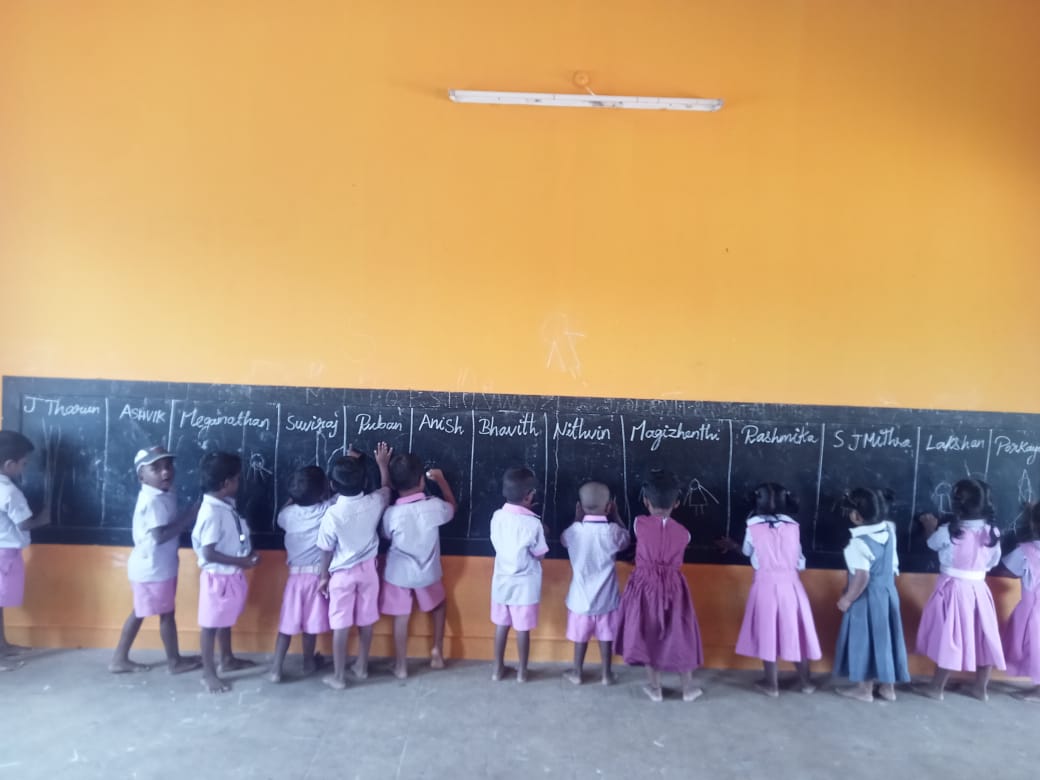
We have two streams of work, one is education and the other is community development. We empower 4 schools to deliver holistic education to over 1000 children from rural Cuddalore. For the community development wing of work, we empower women through skilling and livelihood programs. Cuddalore was gravely hit by the 2004 Tsunami and faces losses every year because of cyclones. Women come from families who do not have any source of income for over 6 months in a year. These are villages that are heavily dependent on fishing, farming, and daily wages. All are uncertain sources of livelihoods. So, these families are in cyclical debt in order to meet their daily expenses, educational and aspirational expenses. Women from these communities face immense barriers in terms of social and cultural aspects, they aren’t allowed to step out of their homes or villages other than for childcare. They are mostly accompanied by a male member of their family, like a husband, father, brother, etc. In addition to that, domestic labour and care work is typically not shared by the male members of the house. Irrespective of how much a woman earns, these are the barriers that she faces at home. This makes it additionally difficult for them to prioritize themselves or learn a new skill. Through our work at Kanavu, we aim to bridge the opportunity gaps that exist in these communities for women and children.
Women’s empowerment is essential for our nation’s overall development. But children are the future, how do you impact their lives?
In Education, Kanavu works in the educational domain of whole-school transformation. We empower schools to sustainably deliver holistic education to children in rural India. We work with 60 teachers, 4 school leaders, and 1100 students in the school cluster coming from over 100 villages. Our program started as an exploration of understanding what it means to deliver quality education in rural schools. The path of our work has been shaped by teachers and their honest reflections. We focus a lot on building relationships with teachers to really understand who they are and what it means to stand and deliver what they do, every day. Their voice has shaped our perspectives on anchoring our programs in the realities of teachers – meeting them where they are while staying true to a vision of bridging plaguing gaps in the rural education system. Our program – Whole School Transformation has 5 key pillars – 1. Teacher Development, we have built an in-house bilingual rubric that teachers and program leads use to reflect on current teacher practice and strengthen the same. 2. School Leader Development that nurtures personal and operational leadership that drives a culture of positive learning in schools. 3. Parent Empowerment where we help parents to support key learning and growth of their children through parent-teacher meetings and awareness programs. 4. Building curriculum for holistic development of children across KG to 10th. We currently have a contextual curriculum and aligned pedagogical practices designed for Early Childhood Education, Arts Education, and the Library program. 5. Cluster Enrichment where with resources and partnerships, we work towards sustainability transforming the schools to deliver holistic education.
What are the toughest challenges an organization like yours faces?

Identifying the right talent and investing in them to build them into staff with the right skill sets. 97% of our staff are women. Owing to cultural expectations, marriage, maternity, change of villages are all reasons why women stop working. To be able to ensure a safe workspace which they will continue working in, has been a necessity.
Ensuring a steady stream of orders, and consistent income for our women is a challenge. With raising costs of cotton and variable pricing, increasing logistics costs, maintaining costs at market price while ensuring a fair wage for the producer. Socioeconomic factors make it difficult for women to come to work. There is a lot of expectation to be a primary caregiver and provider of the family.
Share an account of personal transformation that unfolded as a result of the work conducted within the NGO.
While the women come in for the financial benefits, and the salary, it slowly evolves into being for the community and the workspace, where they derive a lot of joy from, they derive an identity from. They say ‘ I work with Sura’ with so much pride when they talk about the fact that Sura means bravery, Sura gave them opportunities to change their life path. During COVID, we were stitching and distributing masks, with the help of a local NGO. Since the men weren’t able to go out and earn their wages at that time and there was very limited welfare from the state, women were the sole breadwinners of most families. That gave them a sense of confidence and the men started looking at them in a whole different light.
One more aspect is health, when the woman of the house falls sick, it’s like a domino effect, the child falls sick or another member of the family does. They take breaks during such instances and then find it extremely difficult to join work back. Also, because a woman’s income is still seen as an auxiliary income, it is in addition to what a man makes. They find it difficult to work as a result. At Sura, at the very core of it, every woman has opportunities here, whenever she comes, she will find work here. We have had so many women join us back in different roles, we want to put the message out there that we are women-friendly, mother-friendly.
What are the plans for the future?
At Sura, we believe in the power of working women – their ability to impact their families, children, community, and their own lives. We see ourselves steadily strengthening our brand and presence, to support our women to get sustainable earning opportunities. We want to hold space for conversations about women’s lived experiences of working and fighting patriarchy and feminism. We want to grow into a brand that puts a bag in as many hands as we can.
What advice would you give to individuals interested in starting their own NGO or getting involved in similar work?
Build a strong network of people, like-minded and otherwise, who champion your cause, criticize, and help you grow, in good measures.
Build your NGO around the cause; take people along who can further your mission, there is no competition as such
Be very willing to fail and learn; sometimes the learning may come later in time, but stay with the problem.





